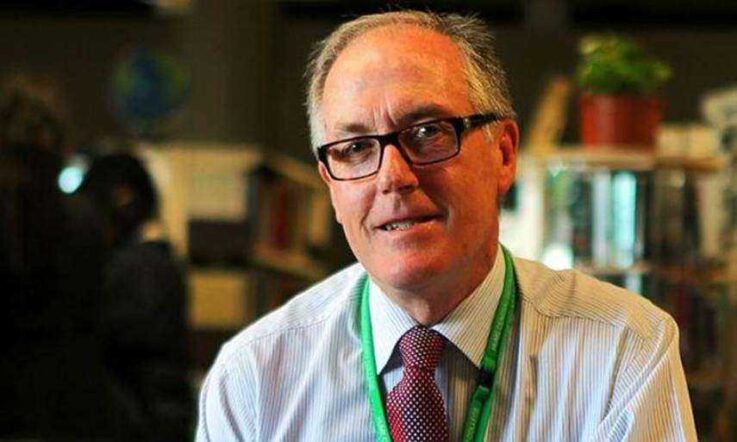This podcast from Teacher magazine is supported by Victoria Teachers Mutual Bank. The Mutual Bank is proud to support the financial wellbeing and professional development of the education community. Visit victeach.com.au to find out how they can help you reach your financial goals.
Thank you for downloading this episode of The Research Files podcast series, brought to you by Teacher magazine – I'm Rebecca Vukovic.
What kind of leader are you, and is your leadership style truly effective?
After looking the UK's performance in the 2012 Programme for International Student Assessment (PISA) study and comparing it to other countries, Dr Alex Hill and his research team decided to find an answer to the question: Why does the UK still lag behind its peers, despite investing more than them? In the process of this research, the team studied over 400 leaders from schools in the UK – the results of which have been published in the Harvard Business Review. In doing so, the team identified that there are five different types of leaders: surgeons, soldiers, accountants, philosophers and architects. Dr Alex Hill, Co-Founder and Director of The Centre for High Performance, joined me on the line from the UK, to discuss why there are five different types of leaders, but only one type that is truly effective.
Alex Hill: I mean it was actually part of a big study looking at 160 academies [independent but state-funded schools], where we were given remote access to their systems so that we could actually observe what they did and how they operated, and we worked with them for seven to nine years, and during that time there was 411 different leaders who led those schools. So for this study, for looking specifically at leadership, we were able to look at 411 leaders and then sort of unpick the actions they took, the beliefs that they had about why schools fail, how you improve them and the impact that they had both whilst they were there, but also quite crucially, what happened after they left.
[02:31] Rebecca Vukovic: I also read in the study that you found: leaders who talk a good game, but have no impact; leaders who make everything look great while they're there, but everything falls apart when they leave; and leaders who could improve the schools' long-term financial standing, but exam results stay the same. As you said, in your study you found that there are five different types of leaders, but I was hoping you could you tell me more about how you went about identifying these leadership styles?
AH: So what we did is we looked at the actions that they took, and in the data set we had we could see month by month what they did. We didn't realise at the time what was going to be the most useful data but after we'd collated the data sets and then we started to look at the patterns that were there, it became very clear that they made changes in different ways. So, in particular, they changed the number and type of students, or they changed the number and type of support staff, or they changed the number and type of teachers, or they changed the costs (reduced the costs), or they tried to grow the revenue. And they focused on different things and you could see from the data what they were focusing on and what they were prioritising.
We then interviewed the leaders and said ‘why do you think schools fail?', ‘how do you think you could improve a school?', and ‘what's your role as a leader helping it on that journey?', you know, ‘are you there for the long term or is it a quick fix and then you pass the school onto somebody else to do the next step?'.
So it's the actions, the beliefs and then we looked at the impact that they had, which resulted from the different actions and beliefs. We looked at lots of different impacts, lots of different measures, but the ones again that became the most useful for identifying the different types of leaders were: what was the impact on exam results year by year when they were there, but also in the three years after they left? And, what was the impact on budget surplus? So, as a result of costs, reductions or changes or revenue changes.
[05:10] RV: Another thing I found really interesting from the report was that you discovered that the most effective leaders were in fact the least well-known, least rewarded, and least recognised. Given that, I was hoping you could go into a bit more detail now and tell me about the five types of leaders that you discovered.
AH: These types emerged when we started to analyse the data at the end and we found, as you say, five types and we gave them names to try and help describe the actions they took and the beliefs they had. Ultimately, we're trying to create a dialogue about leadership within schools so that we can start to improve it.
So the first type we called surgeons. They believe that schools fail because the students don't perform well enough and they are trying to make a quick fix. So they see their role as to make a quick change, improve things and then move on. And the way that they do that is they manage out the poor performing students and make the rest that are still there work harder, move the best teachers to the final year, put on extra exam revision classes etcetera. And exam results changed dramatically whilst they're there, but after they leave they go back to exactly where they were beforehand. So what its showing is that they're not really changing things, they're just managing them differently and they have a short-term impact but then as they go it goes back to where they were – so that's surgeons.
Soldiers – they think that schools fail because they are spending too much money, and that the solution is to cut costs. So they cut and trim essentially. Costs reduce while they're there but again, like the surgeons, after they leave the costs bounce back to where they were before they arrived.
Accountants believe that schools fail because they are too small, and the way to improve them is to make them bigger and stronger and they do that by increasing their revenue. And they are very good at looking at different ways to bring in resources, financial resources. So they would for example look at offering gym memberships or conference facilities or even acquiring another school or attracting more students to the school. So revenue increases dramatically whilst they're there, and it continues to grow after they leave because actually they've made some quite fundamental changes, but the exam results don't change.
Philosophers, they believe that schools fail because they're not teaching properly and they believe the way to improve the school is to actually start a debate and discussion about different ways to teach. So, they spend a lot of their time having dialogue and discussion with teachers but they don't actually change much. They believe that the dialogue and discussion will lead to change and that it's other people's responsibility to make those changes. But they almost see themselves more as experienced teachers than leaders.
And finally we have the architects. They believe that schools fail because they're not serving the local community and they believe the way to improve the school is to actually engage with the local community, with parents and with organisations within that community and then redesign the school so that it meets those needs and, ultimately, helps transform the community. They focus a lot on parents and engagement and also creating the right environment within the school and then they start to improve teaching, but that comes later on.
[09:37] RV: And it's true that you found that architects were the best kinds of leaders for turning around a failing school … ?
AH: We found in the long term they had the most significant impact but, typically, you didn't see an improvement in exam results until the third year. So they spend the first two years laying the foundations. So, things that you would see improve are for example student attendance and student behaviour. We found that student attendance is a pretty good indicator of parental engagement but what you'll also find is that more parents will come to parents' evenings. So you've got this engagement and support from the community that's starting to change, but the exam results don't actually shift until the third year. But they [the results] then continue to improve after they've left.
One of the things they [architects] also do, which the accountants do too but they create an all-through schools – because we focus on secondary schools (from the age of 11 up to 16) – but one of the things that the architects would do is that they would combine with a primary school so that they are teaching the children for longer and they are starting to embed the right culture and the right practice and the right behaviour much earlier on. The accountants do the same thing but they're doing it for revenue, the architects are doing it to improve performance and again that does have a massive impact on performance but there is a delay, it doesn't happen straight away.
[11:27] RV: And just listening now to you talking about the five different leaders, I was thinking that perhaps I didn't fit into any one particular category. So I was wondering, is it possible that we could be a combination of different types of leaders? Perhaps a surgeon and an architect?
AH: You could be, we actually have had emails from people saying ‘I'm an architect but I'm also quite handy with a knife' – that was one that we received. I think the question for me is, ‘if you are cutting, why are you cutting?'. And ‘are you cutting simply to make this year's exam results look good? Or are you cutting because you're trying to create a culture change for the long-term? Or you're cutting to try and improve behaviour?'
Definitely, the architects do change students but it's a much smaller percentage and it is about behaviour. It's about demonstrating to the rest of the school and the rest of the students what isn't good behaviour or what kind of culture we want. Equally, they will change staff and they will change teachers, but it's about improving the capability of the school, or it might be that they realise that the school is too large for its community and it needs to be reduced. So it's about what's the right long-term school for its community and it might be that you need to make some cuts along the way to achieve that.
The surgeons will just make the cuts and then they'll go. So they won't actually then move onto investing and developing, it's simply making a cut and then leaving. And equally, the soldiers will just cut costs, but they then won't start to develop capabilities from there.
[13:42] RV: On a more practical level, for a school leader who is listening to this podcast right now, what could they do to become more like an ‘architect' in their own school setting?
AH: We found that the school that is right for its community does vary depending on the community. So some obvious differences within our study were an inner city school or an urban school, compared with a rural school or a coastal school.
It's very different improving an urban school versus say a coastal school or rural school in terms of its very different attracting talent, attracting good teachers is much harder in a rural community. The kind of community you're serving is very different too, they're often much more transient in an urban community and they'll change. So as the school starts to improve the community around it will actually start to change, whereas in a rural or coastal one, it's quite fixed and it won't change.
So the big thing really is to say, engage your local community with them and say, ‘what is the right school for this community?'. Because it will be different and you need to do that first. You need to engage with them, you need to get the support from them, and then it's thinking about ‘OK, how do I create the right environment within the school?'.
A big mistake of a lot of [head teachers] is trying to improve teaching straight away. You need to create the right environment first. You can't just expect your teachers to sort out your problems for you. You can't expect them to manage behaviour and you can't expect them to teach when they've still got a lot of administrative tasks. So, you need to think about ‘how do I manage behaviour as a leader and create the right culture within a school?' and ‘how do I streamline admin so my teachers can get on and do a great job?'.
So I think there's three main steps: engage the community; create the right environment in the school and the right behaviour, the right culture; and then start to improve teaching. If you do that, then exam results will start to improve and they will continue to improve in the future.
I think we're focusing quite heavily in this study on exam results because previous studies have found the link between test scores or exam results and the gross domestic product of an economy or the vitality of a country's society.
But again, something that architects do is they find the right path for every student. In the way they engage with the community, they will also look at, what are the opportunities for the children after they leave school? Where can they go, what can they do? So they're thinking about the impact that their kids are going to have in society in the long-term, not just necessarily the exam results they're going to get today. But they realise that, ultimately, if they perform better at school academically, they will have more opportunities in the future.
RV: Fantastic! Well, Dr Alex Hill, thanks for sharing your work with The Research Files.
You've been listening to an episode of The Research Files supported by Victoria Teachers Mutual Bank. The Mutual Bank is proud to support the financial wellbeing and professional development of the education community. Visit victeach.com.au to find out more information.
To keep listening or to download all of our podcasts for free, visit acer.ac/teacheritunes or www.soundcloud.com/teacher-acer. To find out more about the research discussed in this podcast, and to access the latest articles, videos and infographics visit www.teachermagazine.com.au
Of the five types of leaders mentioned above, which do you think best describes your leadership style?
Why do you believe schools fail? How do you think a school can be improved?
How do you ensure that the actions you make aren’t just a ‘quick fix’ but rather bring about long term change and improvement?



